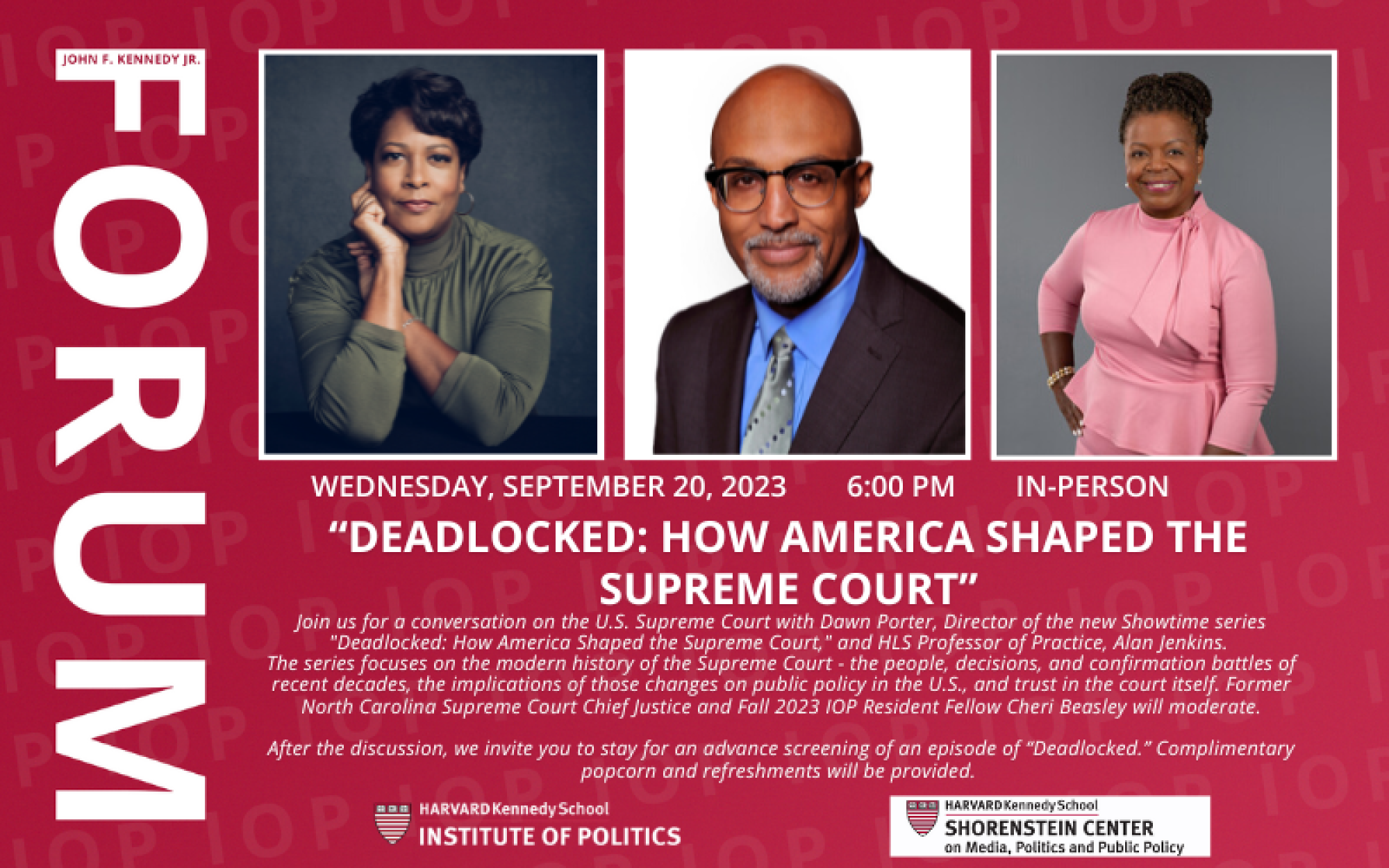
Join us this Wednesday, September 20, for a conversation on the US Supreme Court with Dawn Porter, Director of the new Showtime series “Deadlocked: How America Shaped the Supreme Court.” Premiering at a profoundly consequential time, “Deadlocked” is a four-part documentary series that traces the modern history of the Supreme Court and the people, decisions and confirmation battles that have shaped the Court into what it is today. The series reveals how the Supreme Court’s ideological balance has shifted over the years to reflect the hopes – and fears – of American citizens, exploring the interconnectedness between the Court’s and the nation’s future.
Joining Dawn Porter is Professor of Practice at Harvard Law School Alan Jenkins, who is featured in the series. Former North Carolina Supreme Court Chief Justice and Fall 2023 Institute of Politics Resident Fellow Cheri Beasley will moderate.
After the discussion, we invite you to stay for an advance screening of the fourth episode of the series, “Crisis of Legitimacy.” Complimentary popcorn and refreshments will be provided.
This event is co-sponsored by the IOP.
Please register if you would like the possibility of attending the Forum in person. If a seat is unavailable or you will not be attending in person, viewers can stream the event live via the IOP YouTube or Facebook pages. You do not need to register for virtual attendance.
Dawn Porter has emerged as a leader in the art of storytelling by directing and producing critically acclaimed work. A two-time Sundance Film Festival director, Porter’s latest film The Lady Bird Diaries is an all-archival documentary about Lady Bird Johnson and debuted at the 2023 SXSW Film Festival. Her next project “Deadlocked: How American Shaped the Supreme Court” is a four-part docuseries that explores the history of the United States Supreme Court and the court battles that have shaped America. Other projects include the next installment of the historic civil rights series Eyes on the Prize, as well as The Me You Can’t See, Rise Again: Tulsa and the Red Summer, The Way I See It, John Lewis: Good Trouble, 37 Words and Gideon’s Army. She also won an Emmy for the multi-platform project Un(re)solved, which investigated civil-rights era cold cases.
A graduate of Swarthmore College, Porter majored in political science before earning her law degree from Georgetown University. When she isn’t working behind the camera, Porter frequently lectures at universities across the nation, a passion she honed during her time as Professor and Head of the Documentary Program at the prestigious UC Berkeley School of Journalism. She holds honorary degrees from Swarthmore College and Simmons University.
Porter currently resides in New York City with her family.
Alan Jenkins is a Professor of Practice at Harvard Law School where he teaches courses on Race and the Law, Communication, and Supreme Court Jurisprudence. Before joining the Law School faculty, he was President and Co-Founder of The Opportunity Agenda, a social justice communication lab.
Jenkins’s prior positions have included Assistant to the Solicitor General at the U.S. Department of Justice, where he represented the United States government in constitutional and other litigation before the U.S. Supreme Court; Director of Human Rights at the Ford Foundation, where he managed grantmaking in the United States and eleven overseas regions; and Associate Counsel to the NAACP Legal Defense and Educational Fund, where he defended the rights of low-income communities facing exploitation and discrimination. He previously served as a Law Clerk to U.S. Supreme Court Justice Harry A. Blackmun and to U.S. District Court Judge Robert L. Carter.
Jenkins is a frequent commentator in broadcast, print, and digital media on topics ranging from Supreme Court decisionmaking to racial equity to the role of popular culture in social change. His past Board service includes New York Public Radio, the Center for Community Change, the Legal Action Center, and Futuro Media Group, as well as the Board of Governors of the New School for Public Engagement. He has also served on the Selection Committee for the Sundance Documentary Fund.
Jenkins holds a J.D. from Harvard Law School, an M.A. in Media Studies from the New School for Public Engagement, and a B.A. in Psychology and Social Relations from Harvard College.
Cheri Beasley, a former assistant public defender, served as a judge for twenty-two years. She was the first African American woman to serve as Chief Justice of the Supreme Court of North Carolina. As Chief Justice, she led the statewide court system through the pandemic, creating a safety protocol adopted by other state courts. She modernized the courts’ forty-year-old, outdated technology. During a month of protests around the country, she was the first Chief Justice in the nation to speak out about racial injustice and disparate outcomes in courts. She has worked to make schools safer by expanding School Justice Partnerships and implemented the first paid parental leave policy for judicial employees statewide